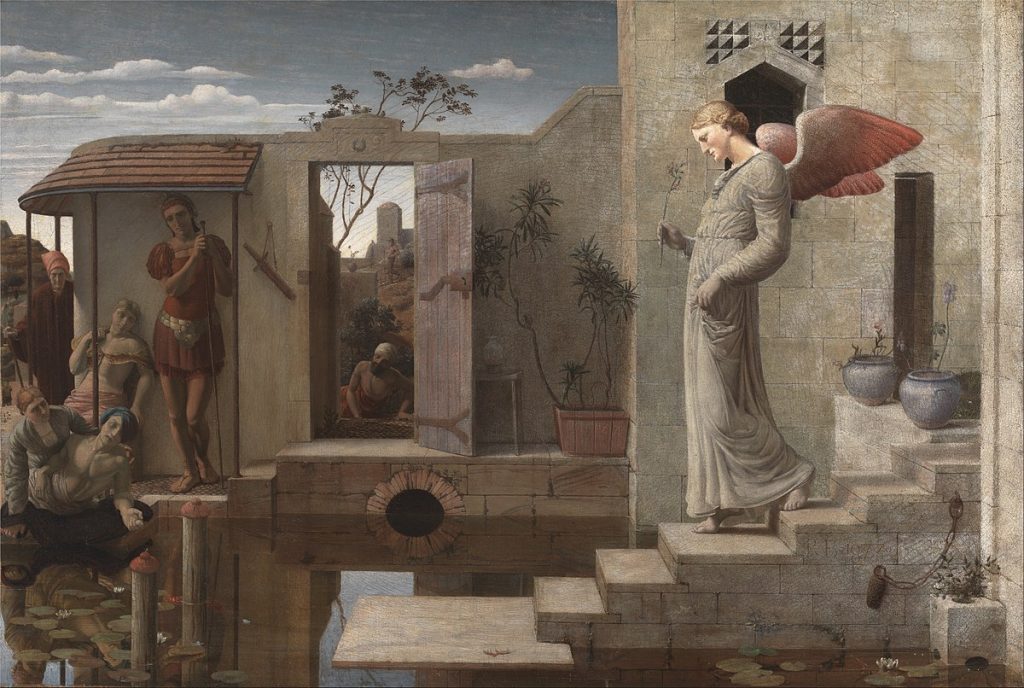
To listen to today’s reflection as a podcast, click here
American playwright Thornton Wilder wrote a one-act play about a miracle that doesn’t take place.
The Angel That Troubled the Waters debuted in 1928. It’s based on John chapter five, where the Gospel describes Jesus’ visit to the pool of Bethesda in Jerusalem. A host of sick people have gathered in the hope that an old folk tale will turn out to be true – that when the angel of the Lord “stirs the waters,” the first person into the pool will be healed.
In Wilder’s play, a physician makes periodic visits to the pool. He is afflicted by depression or “melancholy.”
One day, at last, when the angel begins to stir the waters, he’s first in line.
Then the unthinkable happens. Just as he’s ready to take the plunge, the angel blocks his path. This healing moment is not for him.
How can that possibly be?
The anguished doctor pleads, “It is no shame to boast to an Angel of what I might yet do in Love’s service were I but freed from this bondage.” If he can just be rid of this sickness of the soul, he could help so many people. He could change the world.
But the angel doesn’t flinch:
“Without your wounds, where would your power be? It is your melancholy that makes your low voice tremble into the hearts of men and women. The very angels themselves cannot persuade the wretched and blundering children on earth as can one human being broken on the wheels of living.”
Then the angel adds this powerful word:
“In Love’s service, only wounded soldiers can serve. Physician, draw back.”
Crushed, he steps aside.
Another man enters the pool and is healed. He rejoices.
The healed man immediately turns and addresses the physician: “Please come with me, it is only an hour to my home. My son is lost in dark thoughts. I do not understand him, and only you have ever lifted his mood. Only an hour… There is also my daughter. Since her child died, she sits in a shadow. She will not listen to us, but she will listen to you.”
The apostle Paul, of all people, did not live what recent generations of Christians came to call “the triumphant life.”
Paul suffered from an unidentified malady or limitation that was given to him as “a thorn in the flesh, a messenger from Satan, to torment me” (2 Corinthians 12:7). He pleaded with God to take it away. But God refused his request for healing. “My grace is sufficient for you, for my power is made perfect in weakness” (2 Corinthians 12:9).
Paul opens the same letter to the Corinthians with these stirring words:
“All praise to the God and Father of our Master, Jesus the Messiah! Father of all mercy! God of all healing counsel! He comes alongside us when we go through hard times, and before you know it, he brings us alongside someone else who is going through hard times so that we can be there for that person just as God was there for us. We have plenty of hard times that come from following the Messiah, but no more so than the good times of his healing comfort—we get a full measure of that, too” (2 Corinthians 1:3-5, “The Message”).
If you pursue Jesus with all your heart, hard times lie ahead.
And there is no guarantee you’ll experience supernatural deliverance from the things that seem to hurt the most.
But God promises to make supernatural use of such frailties – your own experiences of failure, betrayal, sickness, depression, falling off the wagon – in the lives of other people.
We don’t have to hide our weaknesses. As Brennan Manning says in Abba’s Child, “If you conceal your wounds, they will never be illuminated – nor can they become a light for others.”
In Love’s service, only wounded soldiers can serve. Without your wounds, where would your power be?
Let God use your life, broken as it is, to become the very means of healing others.
